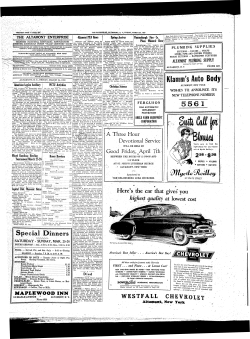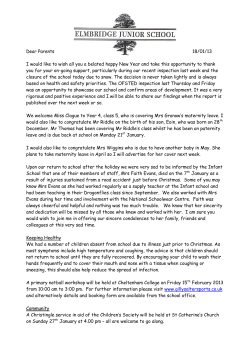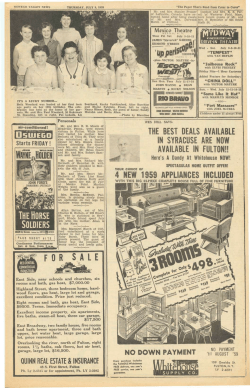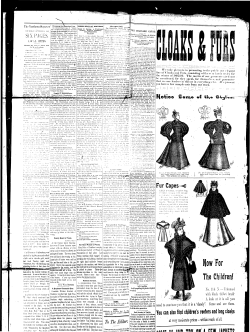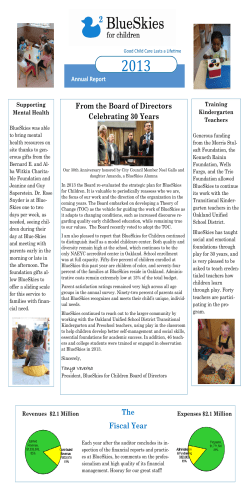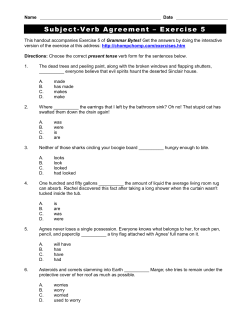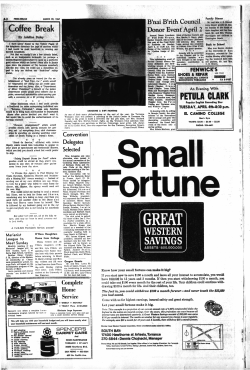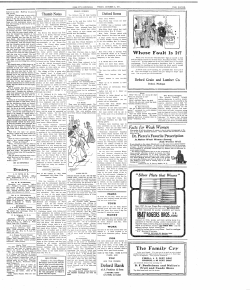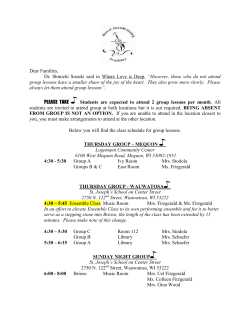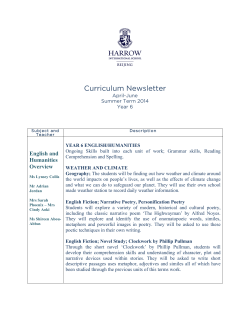
When Someone You Know Has Cancer
When Someone You Know Has Cancer AN ACTIVITY BOOKLET FOR FAMILIES Watch the ARTHUR episode “The Great MacGrady” with your child. How can we dren when s u p p o r t o u r c h il a r e a b o u t s o m e o n e t h e y c k in s id e h a s c a n c e r ? L o o iv it ie s , fo r a s t o r y , a c t a n d id e a s . This booklet was made possible by a cooperative agreement with LIVE STRONG, which seeks to inspire and empower people affected by cancer. Dear Families, th e U. S. w ill be di ag no se d in le op pe e re th in e on e, Du ri ng th ei r lif et im n’ s liv es w ill be to uc he d by re ild ch ny ma lt, su re a As . w it h ca nc er nt , gr an dp ar en t, or ot he r re pa a e— on d ve lo a of s si th e ca nc er di ag no nc er su rv iv or an d pa re nt of ca a As r. he ac te or , nd ie fr re la ti ve , a to fin d a w ay to ta lk is it t an rt po im w ho ow kn yo un g ch ild re n, I ho pe fu l, in sp ir in g, e, at ri op pr ap eag is at th ea t w it h ki ds ab ou t ca nc er RT HU R pr og ra m, “T he Gr A e th at th is pe ho r Ou an d em po w er in g. th at co nv er sa ti on n gi be u yo lp he ill w t le ok M ac Gr ad y, ” an d th is bo w it h yo ur ch ild . mi lli on pe op le ar ou nd th e 28 e th r fo ht fig e w , NG RO At LI VE ST — an d sh ou ld be — lif e be n ca e er Th y. da to er nc ca w or ld liv in g w it h . M ac Gr ad ys in rs M e th l al to ’s re He . le op af te r ca nc er fo r mo re pe ho lo ve th em ! th e w or ld an d th e pe op le w © 2009 WGBH EDUCATIONAL FOUNDATION La nc e Ar ms tr on g LI VE ST RO NG This booklet grew out of a collaboration between WGBH and LIVE STRONG, and our shared desire to help families talk with their children about cancer, answer their questions, reassure them, and suggest ways they can show their love and get involved in the fight against the disease. 2 When Someone Your Child Knows Has Cancer… ow can we best inform and provide support for our children when a family member or other important adult in their lives is diagnosed with cancer? H Talking honestly and openly with your child about cancer and encouraging him or her to ask questions is an important first step. Here are some guidelines that may be helpful in starting that conversation. Find out what your child already knows. Start the conversation by finding out what your child has already heard, noticed, or perhaps imagined about the person’s illness. This helps you discover what your child understands and what worries and misconceptions he or she may have. Use the real words. Use the word cancer when you tell your child about the illness. Clear language can prevent all sorts of misunderstandings. For example if you say, “Grandpa’s stomach is sick,” children may worry that they have the same medical condition and will need the same treatment as Grandpa the next time they have a tummy ache. Be both truthful and hopeful. Let your child know that the medical team is working very hard to help the person become strong and well again. The person may feel worse for a while as the medicine (i.e., chemotherapy), radiation, or surgery does its job, but when the treatment is over, the person will hopefully be healthy again. How to Use This Booklet • Read the story “The Great MacGrady” (pages 5–11) with your child and talk about it. • If you are a parent with cancer, or if your spouse has cancer, see pages 12–13. • Play Tic-Tac-Feelings and/or do the Worry Stack activity with your child (page 14). • Look for some of the recommended books and resources (page 15). The suggestions in this booklet were developed with the help of the PACT program (Parenting At a Challenging Time) at Massachusetts General Hospital Cancer Center. For more information, visit www.mghpact.org. © 2009 WGBH EDUCATIONAL FOUNDATION Encourage your child to ask questions. Here are some questions children frequently ask. Young children (ages 3–6) and school-age children (ages 6–10) may ask different questions and have different concerns. How did Grandma get cancer? Can I catch cancer from her? Young children often worry that they caused the cancer. For example, was it because they jumped on Grandma? Was it because they were too noisy? School-age children may worry that the cancer was caused by germs they brought home from school, or think that they need to stay away from the person because cancer is contagious. You may need to reassure your children repeatedly that these ideas are not true; they did not cause the cancer and they cannot catch cancer from someone who has it. Cancer is not like a cold. It’s a very complicated disease. You can’t give someone cancer and you can’t catch it from them. That means it’s absolutely fine and safe to hug and cuddle with Grandma just like you always do. 3 Why did Grandma get cancer? It’s not fair! “When Mr. Springer [our principal] got sick, some things did change-like he lost his hair and started wearing a cap-but other things didn’t, like every morning he was here he would come on the intercom and announce the birthdays. He was still Mr. Springer.” —ELEMENTARY SCHOOL STUDENT School-age children often believe strongly in the principle of fairness —the good should be rewarded and the bad should be punished. Agree and sympathize with your child. You’re right. Cancer isn’t fair. It’s not Grandma’s fault she has cancer. It’s just the way it happened. Why did Grandma lose her hair? Young children may be confused by the changes in their loved one’s appearance. They may wonder, is Grandma still Grandma without her hair? Assure them that Grandma is always Grandma, with or without hair. Grandma is taking special medicine that makes her hair fall out, but she’s still the same person. When she finishes taking the medicine, her hair will grow back. Using the term chemotherapy and offering basic information about the treatment may help school-age children understand why their loved one has no hair. Grandma is taking some really strong medicine called chemotherapy. The good thing is that the medicine can shrink the cancer and can help make it disappear. The bad thing is that it makes her hair fall out and sometimes makes her feel sick to her stomach. Respect your child’s feelings. “My son (age 9) told me to stop saying that each visit to see Grandma should be special because ‘it might be our last.’ He was right. The visits were special because my kids loved spending time with their grandma. They were making good memories, not good ‘last’ memories.” — MOTHER, RECALLING HER CHILDREN’S EXPERIENCE When someone is very sick, it’s often hard for children (and grown-ups!) to know what to say or do. Like the characters in “The Great MacGrady,” children respond very differently when told about a loved one’s cancer. Feeling angry, worried, confused, or even disinterested are all normal reactions. Let your child know that you know that he or she cares about the person. You may want to share some of the things that help you manage your own feelings of anger and sorrow about the cancer. Take care of yourselves. At this time, we do not know how to prevent all cancers, but there are practical things we can do to help keep ourselves safe and healthy. Your child can be part of a family effort to: • Stay away from cigarettes • Use sunscreen © 2009 WGBH EDUCATIONAL FOUNDATION • Eat nutritious food—plenty of vegetables and fruits • Get exercise every day Reach out and take action. With your child, think of some loving, helpful things you could do for the person or family you know who is dealing with cancer. For example: • Visit and spend time doing quiet things you have always liked doing together, like chatting, reading books, or playing games. • Bring the person or family a meal or a movie. • Make a “get well” or “thinking of you” card. • Shovel their sidewalk, walk their dog, or do other simple chores. • Participate in a fundraiser. Have a bake sale, collect bottles or pennies, or join a walk or bike-a-thon (see Resources, page 15). 4 ® The Great MacGrady A read-aloud story adapted from the ARTHUR PBS KIDS GO Series here is Mrs. MacGrady? A new cook has taken her place in the lunchroom—and the food he serves is truly awful. W In the classroom, Mr. Ratburn makes an announcement. “Unfortunately, Mrs. MacGrady will be away for some time. Mrs. MacGrady is sick. She has cancer. The good news is that they found it early. She has a great medical team and they are all working very hard to help her get better.” Francine turns to Muffy. “Cancer!” she gasps. “My grandfather had cancer.” “Francine, she’ll be fine,” says Muffy. “How do you know that?” asks Francine. © 2009 WGBH EDUCATIONAL FOUNDATION “I just do,” answers Muffy. “This is Mrs. MacGrady we’re talking about. She never gets sick.” “Well, she’s sick now,” snaps Francine. “And some people never get better.” Watch “The Great MacGrady” with your child. Check your local PBS station schedule or download the episode from iTunes®. 5 hat day after school, Arthur and D.W. walk over to Mrs. MacGrady’s house. Arthur is carrying a bag with a jar of chicken soup they made with their dad. D.W. is carrying her doctor’s kit. As Arthur rings the doorbell, D.W. puts on her doctor’s mask. T “D.W., take that off!” whispers Arthur. “I don’t want to catch the cancer,” D.W. whispers back. Mrs. MacGrady opens the door. She laughs when she sees D.W. wearing the mask. “Don’t worry, sweetie,” she says. “You absolutely, positively can’t catch cancer from me. I promise.” © 2009 WGBH EDUCATIONAL FOUNDATION Mrs. MacGrady invites the kids in. Because Mrs. MacGrady is getting treatment for cancer, she has to be very careful not to catch a cold, so she asks Arthur and D.W. to wash their hands. 6 M rs. MacGrady eats a bit of chicken soup and puts her feet up to rest. D.W. takes out her stethoscope. She listens to Mrs. MacGrady’s knees. “Your knees sound normal,” D.W says. “Are you sure you’re sick?” © 2009 WGBH EDUCATIONAL FOUNDATION “Cancer isn’t like a cold,” says Mrs. MacGrady, and she draws a picture to explain. “You see, our bodies are made of teeny-tiny things called cells. You can think of them as flowers in a garden. Our bodies make them every day. Unfortunately, my body is also making a few weeds. Right now I am taking medicine called chemotherapy that is helping my body get rid of those weeds. It’s strong medicine and it makes me feel really tired.” Arthur notices how tired Mrs. MacGrady looks. “We’ll let you rest,” he says. “Come on, D.W., let’s go.” Mrs. MacGrady smiles. “Come again, soon!” she says. 7 rancine is feeling blue, when Buster and Binky walk by. “Hi Francine,” says Buster. “We’re on our way to visit Mrs. MacGrady. Want to come?” F “No,” says Francine. “I want to remember Mrs. MacGrady the way she was—not sick with cancer.” “Mrs. MacGrady is still Mrs. MacGrady, even if she’s sick right now,” says Binky. “You know, my mom says it might make you feel better if you talked to someone who has survived cancer—like Lance Armstrong. I wrote down his email address for you. He gave it to me at the Bike-A-Thon. You know he had cancer, right?” “Cancer?” asks Francine. “Did he have to quit biking?” “Are you kidding?” says Binky. “Lots of people thought he’d never race again, but he did and he was better than ever. He won the Tour de France, the world’s hardest bike race, seven times. And he’s still racing!” “Wow,” says Francine. “That’s cool.” “You should write to Lance,” says Binky. “Tell him about Mrs. MacGrady.” © 2009 WGBH EDUCATIONAL FOUNDATION That evening, Francine sits down at the computer and writes. Hi Lance, I’m afraid. Really afraid. My friend, Mrs. MacGrady, is the cook at our school and one of the coolest I’m afraid. Really afraid. and most amazing people I know. And now she has cancer. So this is what I want to know— Will she be OK? Thanks. Francine 8 uffy is bringing Mrs. MacGrady a fancy gift basket. When she answers the door, Mrs. MacGrady has a bandana on her head. M “I love your bandana!” says Muffy. “Thanks,” says Mrs. MacGrady. “I thought about getting a wig, but I think this will do.” “You mean you’re bald under there??” asks Muffy. “Yup, it’s a side effect of the medicine,” says Mrs. MacGrady. “But it will grow back.” “I had no idea you were so sick,” says Muffy. “Well, cancer is no walk in the park,” says Mrs. MacGrady. “But I have great doctors and a great support team, and I intend to get better!” © 2009 WGBH EDUCATIONAL FOUNDATION Martha, Mrs. MacGrady’s sister arrives. She is going to drive Mrs. MacGrady to a doctor’s appointment. Then Arthur and D.W. come with a bag of fresh fruit. “Let’s put that fruit in the refrigerator,” says Martha. The kids notice there are dirty dishes in the kitchen sink and that the trash can is full. “Do you think Mrs. MacGrady would mind if we did a little cleaning?” asks Muffy. “I think she would love it,” says Martha. “You can be part of our support team!” Muffy, Arthur, and D.W. tidy up the house. When Mrs. MacGrady gets home, the place looks great! 9 ance Armstrong has written to Francine to say that he’s going to be in town. That weekend, he knocks on Francine’s door. He asks Francine’s parents if she can go bike riding with him. They ride up and down hills, then stop to rest. L “You don’t seem like someone who’s had cancer,” says Francine. “You’re so healthy!” “When I had cancer, I was very sick,” says Lance. “But I had strong medicine, some operations, and tons of support from my family and friends.” “I wish there was something I could do for Mrs. MacGrady,” says Francine. “Being a good friend IS doing something,” says Lance. “Spending time together, doing little things to help out, laughing together. That’s really important.” “Do you think there’s a cure somewhere for cancer?” asks Francine. © 2009 WGBH EDUCATIONAL FOUNDATION “Maybe,” says Lance. “And you might be the person to discover it. But until then, there are other helpful things you can do.” “Well… George is watering Mrs. MacGrady’s garden and Prunella is knitting her a scarf,” says Francine. “Maybe I could help them.” That’s great!” says Lance. “Or, if you have time, you can give me a hand.” Lance shows her a flyer that says Pedal for a Cure. “You can help me set up a bike race in Elwood City. All the money we raise will go to help people with cancer.” Francine signs up lots of people to take part in the bike race. 10 T he big day arrives. The turnout is amazing! “Thanks for the help, Francine,” says Lance. “Ready to ride?” “You bet!” says Francine. The race begins. Francine bikes as fast as she can. As she crosses the finish line, the crowd cheers. Francine grins. “Wow! That was some performance!” says a familiar voice. “Mrs MacGrady!” says Francine. “You came! Does that mean you’re all better?” “Not quite,” says Mrs. MacGrady. “But I’m feeling pretty good today. In fact, I plan to come back to work in a few weeks.” “I’m sorry that I haven’t come to see you,” says Francine, feeling ashamed. “I just…I was afraid that…I might get too upset or something….” “I understand,” smiles Mrs. MacGrady. “It can be pretty hard to see someone you care about when they are sick.” Francine nods. “There’s something you could do for me now, though,” says Mrs. MacGrady. “Just name it,” grins Francine. © 2009 WGBH EDUCATIONAL FOUNDATION “You could give me a hug!” says Mrs. MacGrady. And Francine does. Talk about the S tory Ask questions that invite your child to expres thoughts and fe s his or her elings. If someo ne close to your cancer, talk ab child has out ways your own experience (or different fr s are similar to om) the situat ion in the stor y. • How do you think Francine feels when she Mrs. MacGrady learns that has cancer? • Why do you think Mrs. Mac Grady is weari picture? Do yo ng a scarf in th u think Francine e can catch Mrs cancer by hugg . MacGrady’s ing her? • Does the stor y give you idea s about things help we could do to (a person in yo ur child’s life w another seriou ho has cancer or s illness)? 11 If You or Your Spouse Has Cancer… f you are a parent who has cancer, or the spouse or partner of a parent with cancer, you are dealing with many difficult situations and feelings. Talking and sharing feelings will let your child know that, as a family, you can help each other during this tough time. I 1. Talk about what is happening. Tell your child about the cancer “Meeting with the school counselor or nurse to process some of the facts, thoughts, and feelings about the illness, or just to check in, can help a child know that she or he is not alone in this challenging situation, and that there are caring adults at hand.” diagnosis and the goal of the treatment. Use a doll, toy animal or a picture to show your child where the cancer is. Keep explanations simple. Be both honest and hopeful. Tell your child that there are a lot of unknowns, but that as you and your doctors learn more, you will let your child know as well. 2. Maintain familiar routines. As much as possible, keep family life and daily schedules the same as usual for your child. When needed, discuss how the treatment will affect his or her routine, so that your child is prepared for the changes. Spend extra relaxed time together and focus your attention on your child and her or his interests. Read books, look at photo albums together, watch DVDs, laugh, play, snuggle, and enjoy each other’s company. Even older children appreciate extra cuddle time when a parent is ill. — SCHOOL ADJUSTMENT COUNSELOR 3. Build a support team for home. Give your child a voice in © 2009 WGBH EDUCATIONAL FOUNDATION choosing a support team. Ask, If I need to call a babysitter, who is your favorite? If another grown-up needs to give you a ride to soccer, whom would you like me to ask? Your child’s first choice may not always be available, but as much as possible, try to be guided by your child’s preferences. Let your child know that you and other caring adults will be there for him or her throughout this challenging time. 4. Build a support team at school. Adults at school can be an important part of your child’s support team. Meet with the appropriate people at your child’s school (your child’s teacher, guidance counselor, school nurse, etc.) and let them know about the family situation. Give them some concrete suggestions on how to support your child. Talk with your child ahead of time. Together you can decide if you want the teacher to keep the information private or whether it would be OK for classmates to know. At your school meeting, find out who is the best person for your child to talk to, if and when your child feels the need. You may wish to explain that you want school to be an oasis for your child, an escape from the medical situation at home. For young children especially, it is important that adults at school greet them with enthusiasm and excitement about the day. You don’t want your child burdened with sad faces and worried questions about how things are going at home. 12 Ages and Stages For children ages 3–6 • Young children use fantasy play to process information and face challenges. Provide bandages and a doctor kit. Let your child act out any medical story he or she chooses. Watch and listen for concerns or misunderstandings your child may express. If you discover your child has some mistaken ideas about cancer, do not interrupt the play. At a later time, gently correct your child’s misconceptions. • Help your child understand that he or she can’t make the cancer better or worse, but he or she can make you or your spouse feel better in lots of ways—with pictures and stories, jokes and hugs. For children ages 6–10 Some school-age children have lots of questions about how cancer in the family is going to affect them and what is going to happen next. Other children are less talkative. Activities such as the ones suggested below and on page 14 provide a structure that makes it easier for some children to share their thoughts and feelings. Try the ones that you think may engage your child. The most important thing is to let your child know you are always available and he or she need not worry alone. • At the bottom of two pieces of paper write: My favorite thing to do with you. You and your child will each draw a picture. Share your drawings and figure out a time to do the two activities together, modifying them as needed. Take photos of the two of you having fun together. © 2009 WGBH EDUCATIONAL FOUNDATION • Write labels on the back of small paper plates: Someone I can talk to. Someone who can help me with my homework. Someone who can come to my soccer games. Someone who can make my favorite cookies. Have your child think of someone who could fill each role when your illness makes you unavailable, and draw that person on the front of the plate. “When my hair started really getting thin, I got my electric razor and handed it to my seven-year-old. I said, ‘Here, I need this shaved off.’ So my daughter took the razor and started shaving. Then my older daughter came up and thought it looked like fun, so they ended up having a great time... I think it helped them realize that [although] there was something wrong, I was still the same person.” —FATHER, CANCER SURVIVOR (EXCERPTED FROM A SURVIVOR STORY STRONG.ORG) ON WWW.LIVE STRONG “Our ten-year-old wanted to hear about the details of his dad’s cancer treatment. It helped him to know how this would affect his daily schedule and his plans for the summer. Our younger son just wanted to know his dad was doing OK and he wanted extra snuggling and hugs from us.” —PARENTS OF TWO BOYS, AGES 10 AND 6 13 Talk and Play Tic-Tac-Feelings When Arthur and his friends learn that Mrs. MacGrady has cancer, they have lots of different reactions. Maybe your family is having a similar experience with cancer or another serious illness. This game gives you and your child a chance to share feelings about the changes that have recently happened in your life. You’ll need two types of game pieces, such as pennies and buttons. Take turns putting a game piece on a tic-tac-feeling square. Share something that makes you feel that way. For example, you can say, It makes me feel sad when mom is too tired to play. happy worried angry hopeful sad proud scared excited disappointed © 2009 WGBH EDUCATIONAL FOUNDATION Worry Stack Being a sympathetic listener can help lighten your child’s worries. Invite your child to put building blocks in a stack. Each block represents a worry. Ask your child to name the worries as he or she builds the stack. One child whose father is going through cancer treatment named these: What will it be like when Daddy gets surgery? Will he change? How can I concentrate at school? Then, break the worry stack down. This time each block will represent something your child can do to ease the stress and feel less alone with each worry. For example, make a list of questions you can ask the doctor together, or think of things you have done in the past that helped make other life changes—such as moving to a new home— go more smoothly. Remove a block as you talk about each idea, until the stack is gone. 14 Resources FOR CHILDREN Preview these resources to make sure you are comfortable with the contents. Even if you decide not to share a given book or video with your child, you may find some of the language and ideas useful as conversation starters. Books Tinkham, Kelly. Hair for Mama. Dial, 2007. A loving African-American family copes with cancer. Ackermann, Abigail and Adrienne. Our Mom Has Cancer. American Cancer Society, 2002. Written and illustrated by two sisters, ages 11 and 9, about their family’s experience with breast cancer. DVD American Cancer Society. Because Someone I Love Has Cancer: Kids’ Activity Book. American Cancer Society, 2003. A journal for kids ages 6–12 with lots of drawing and writing suggestions. FOR ADULTS Borden, Louise. Good Luck, Mrs. K! Aladdin, 2002. Mrs. K, the popular third-grade teacher, is diagnosed with cancer. The kids send letters and Mrs. K writes back. Buckley, Colleen. Grandma Kathy Has Cancer. Dog Ear Publishing, 2007. A grandchild celebrates her playful, tender relationship with her grandma. Kohlenberg, Sherry. Sammy’s Mommy Has Cancer. Magination Press, 1993. Loving parents help Sammy accept the changes in the family’s lives when his mom is diagnosed with cancer. © 2009 WGBH EDUCATIONAL FOUNDATION Speltz, Ann. The Year My Mother Was Bald. Magination Press, 2002. Sketches, lists and clippings make this journal fun to read and very informative. (for older children) McVicker, Ellen. Butterfly Kisses and Wishes on Wings. Ellen McVicker, 2006. A helpful, hopeful book to share with children when someone they care about has cancer. Ries, Lori. Punk Wig. Boyd Mills Press, 2008. Cancer treatment makes Mom lose her hair, so she and her son go shopping for a wig. Silver, Alex, Emily and Anna Rose Silver. Our Dad Is Getting Better. American Cancer Society, 2007. Three young siblings wrote this book based on their own experiences with a parent’s cancer. Cancervive. Kids Tell Kids What It’s Like When Their Mother or Father Has Cancer. Available from http://www.cancervive. org/dvd/html. National Cancer Institute www.cancer.gov Information on many topics and concerns. For tips on talking to children, go to www.cancer.gov/cancertopics/ when-someone-you-love-is-treated and click “Talking with Family and Friends.” CureSearch curesearch.org Information on childhood cancer for parents and families. Dana Farber Cancer Institute: Family Connections www.dana-farber.org/pat/support/ familyconnections/default.html Books TAKING ACTION Harpham, Wendy Schlessel, MD. When a Parent Has Cancer: A Guide to Caring for Your Children. HarperCollins, 2004. There are many ways that you and your children can support people who are dealing with cancer. Some examples are suggested on page 4. As a family, you may also be interested in participating in awareness-raising or fund-raising events sponsored by a national organization. Heiney, Sue P., PhD, RN et al. Cancer in the Family: Helping Children Cope with a Parent’s Illness. American Cancer Society, 2001. Rauch, Paula K., MD. and Muriel, Anna C. MD. Raising an Emotionally Healthy Child When a Parent Is Sick. McGraw-Hill, 2006. van Dernoot, Peter. Helping Your Children Cope with Your Cancer. Hatherleigh Press, 2006. Online Resources LIVE STRONG at School www.LIVE STRONG.org/school Free, online K–12 lessons that help teachers provide information about cancer in a way that is inspiring and hopeful. This Web site also includes a letter that parents can use to inform schools about this curriculum. (See “Get Involved.”) LIVE STRONG www.LIVE STRONG.org LIVE STRONG fights for the 28 million people worldwide living with cancer, giving people the resources and support they need to fight the disease head-on. American Cancer Society www. cancer.org Learn about Relay for Life, Daffodil Days, and Making Strides Against Breast Cancer, and find dates for upcoming events in your area. Massachusetts General Hospital Cancer Center: Parenting At a Challenging Time www.mghpact.org/parents.php The Marjorie E. Korff PACT Program is a parenting program developed at the Massachusetts General Hospital Cancer Center to address the common challenges and needs of parents with cancer. 15 For mor e inform ation ab LIVEST out RONG, visit www.L I V ESTRO N G .org tion nforma i e r o ® visit For m , RTHUR A t u ur abo g/arth r o . o g s pbskid “Cancer touches the lives of so many of our children. Talking together helps children learn about cancer, express their feelings, and share their worries. It is your loving support and guidance that will help your child cope best. This ARTHUR episode and family booklet are a wonderful way to start this important conversation.” —PAULA K. RAUCH, MD, FOUNDER OF PACT PROGRAM AT MASSACHUSETTS GENERAL HOSPITAL CANCER CENTER This guide was produced by the Educational Outreach department of WGBH. Director, Educational Outreach SPECIAL THANKS TO Julie Benyo Dr. Paula K. Rauch and the PACT program (Parenting At a Challenging Time) at Massachusetts General Hospital Cancer Center for their guidance in developing the contents of this booklet. For more information, visit www.mghpact.org Manager, Educational Content Sonja Latimore Manager, Educational Outreach Mary Haggerty Associate Manager, Educational Content Cyrisse Jaffee Editorial Project Director Elly Schottman Outreach Project Director Gay Mohrbacher Designer Danielle Edson Print Production Lenore Lanier Gibson ARTHUR is produced by WGBH Boston and Cookie Jar Entertainment, Inc. Funding for ARTHUR is provided by public television viewers. ADDITIONAL ADVISORS Nancy Carlsson-Paige Professor of Education, Lesley College, Cambridge, MA Jill Charney School Adjustment Counselor, Somerville, MA Magnolia Contreras, MSW, MBA Dana-Farber Cancer Institute, Boston, MA This booklet was made possible by a cooperative agreement with LIVE STRONG, which seeks to inspire and empower people affected by cancer. LIVE STRONG is a registered trademark of the Lance Armstrong Foundation. Corporate funding is provided by Chuck E. Cheese’s®. © 2009 WGBH Educational Foundation. All rights reserved. All characters and underlying materials (including artwork) copyright by Marc Brown. ARTHUR, D.W., and the other Marc Brown characters are trademarks of Marc Brown. All series artwork © WGBH Educational Foundation / Cookie Jar Entertainment, Inc. All third party trademarks are the property of their respective owners. Used with permission. http://pbskidsgo.org/Arthur • 0906063-A
© Copyright 2026
